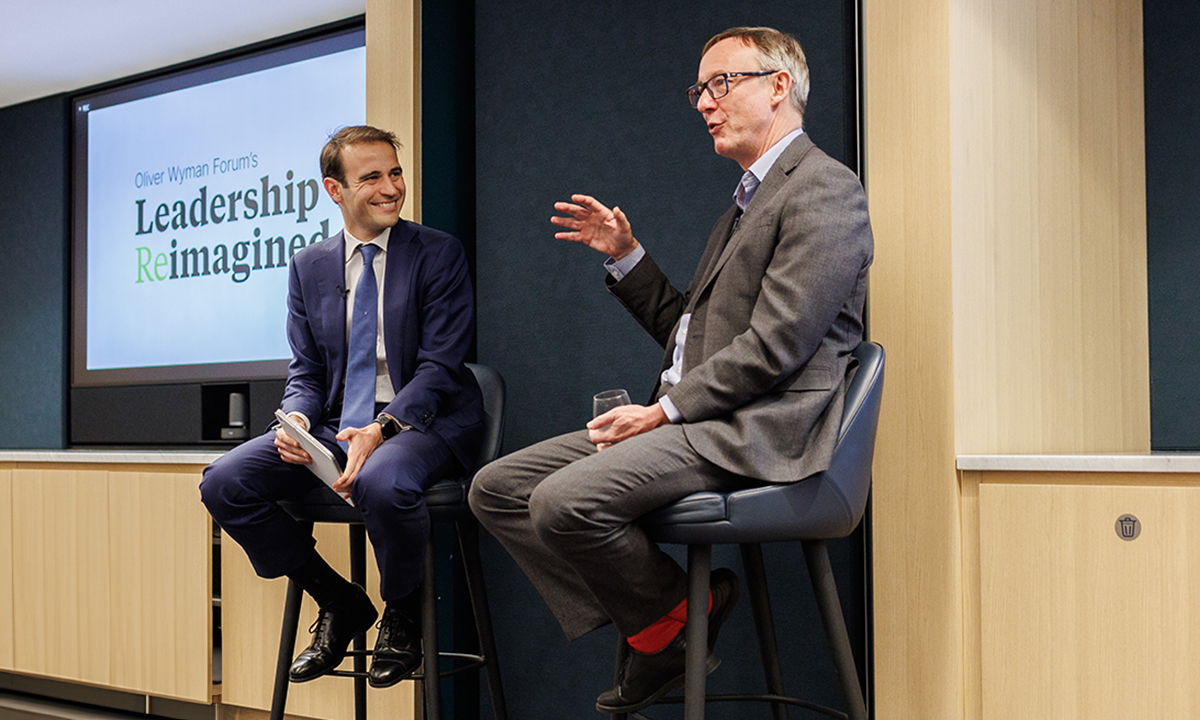As Britain edges closer to a general election, a big question for voters and business is what impact the outcome might have on fiscal policy. To consider what’s at stake, we recently convened senior leaders for a discussion with one of the UK’s leading budgetary authorities, Paul Johnson, director of the Institute of Fiscal Studies.
Johnson didn’t sugarcoat the economic and budgetary challenges the country faces. The economy is in borderline recession territory after having just barely recovered to pre-pandemic output levels, the national debt stands at a 60-year high of nearly 100% of GDP, and taxation absorbs a record amount of national income. So far neither the governing Conservatives nor the poll-leading opposition Labour Party offer many hints of how they would deal with these problems. Yet deal with them they must after the election, which most analysts expect to take place this autumn. Here are some of our key takeaways:
- Whoever takes over at No. 10 will face a truly historic challenge. From having one of the lowest debt levels of any developed country less than two decades ago, Britain now has one of the highest. Big bank bailouts during the global financial crisis, an ever-growing tab for healthcare and other public services, and costly intervention to stem the COVID-19 pandemic ramped up deficit spending and the debt. The post-pandemic surge in interest rates has compounded the problem, with debt service costs accounting for nearly 10% of government spending. Corporate tax as a share of GDP is at a record high, reflecting both a rise in tax rates and low levels of investment, which are likely to subdue future growth. Few batted an eye recently when former Chancellor Kenneth Clarke described the problems that will confront the next government as the biggest since World War II.
- The nature of the challenge defies quick or easy solution. A strong economy enabled the UK to grow out of previous debt problems in the post-war years and again in the 1980s, but Britain has been growing more slowly than the European Union average – and well below US levels – since 2016, according to the International Monetary Fund. Many people in their prime working years are at risk of being left behind. The number of people claiming disability benefits jumped by around 25% during the pandemic, and increasingly many claimants are relatively young. According to Paul, a 30-year-old person with low educational achievement is more likely to be on disability today than a highly educated 60 year old. The peace dividend that enabled governments to divert resources from defense to social services and other areas in the 1980s and ‘90s has long since been spent, and looks more likely to become a tax as government faces up to a more conflict-prone world. The climate transition also is likely to impose growing costs in the years ahead.
- No one is yet facing up to the need for hard choices. Two years ago, Chancellor Jeremy Hunt adopted a fiscal rule requiring government debt to be falling as a share of GDP in the fifth year of its forecast period, but that can enable any government to put off a budget reckoning indefinitely. For Labour’s part, shadow Chancellor Rachel Reeves has promised to retain that five-year rule but permit borrowing for investment. Budget debates revolve around proposed reductions in the growth of spending that almost no one believes are possible or politically realistic because they would require deep cuts in anything that isn’t the NHS or defense. This isn’t exactly surprising in a pre-election period when parties are eager to curry favour with voters, but it suggests that politicians are squandering an opportunity to build support for touch choices and real reform after the election.
- Limited fiscal headroom means the new government will have to focus on structural reform. Such an approach could bring potentially significant benefits. For example, both Conservatives and Labour talk about pro-growth initiatives to mobilise private sector investment, which could include regulatory measures to encourage large allocations to equities by pension funds. Labour leader Keir Starmer has talked about reforming the country’s onerous planning system, which tends to slow commercial development and impede the building of housing where it’s most needed. But such structural changes are difficult to achieve and can take years to produce tangible economic benefits. This kind of agenda typically requires political commitment extending over the life of more than one parliament, which means the size of the next government’s majority will be crucial.
The conversation underscored the scale and complexity of today’s fiscal challenges, which will require time and effort from all of us in the private and public sectors. Beginning with Brexit and amplified by great power competition and the pandemic, we have seen politics increasingly shape markets, a change from the pattern that prevailed during globalisation’s go-go years. An unsustainable fiscal trend, if unaddressed, risks a painful market backlash.

